#wilbur erasure frankly
Text
charlie and quackity really talking the other day about how theyre the worst minecraft players on the server as if wilbur 'falls to his death off a tree he's chopping down twice' soot isnt RIGHT there
85 notes
·
View notes
Text
Neocolonialism and Indigenous Communities in the Americas
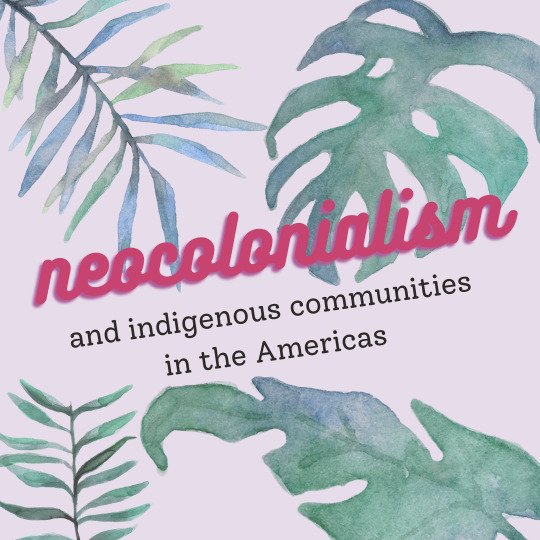
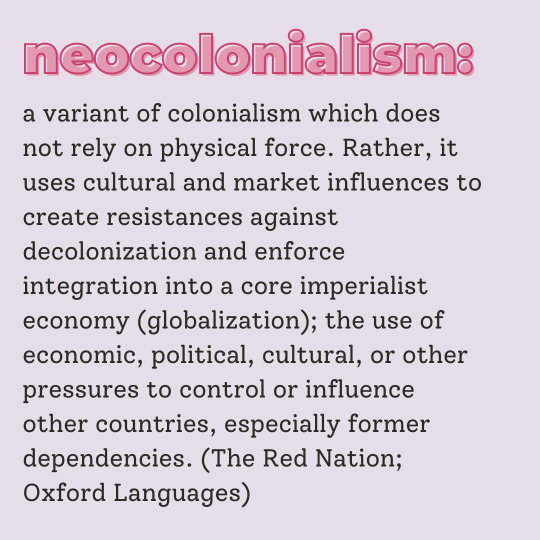
Through the lens of neocolonialism, it is important to point out that this form of colonialism is mostly dependent on cultural forces and ideas in order to maintain the power and influence of white settlers (or even non-white settlers that have access to a lot of power, money, and influence; corporate capitalists, basically).
neocolonialism: a variant of colonialism which does not rely on physical force. Rather, it uses cultural and market influences to create resistances against decolonization and enforce integration into a core imperialist economy (globalization); the use of economic, political, cultural, or other pressures to control or influence other countries, especially former dependencies. (The Red Nation, Oxford Languages) [for a more expansive definition of neocolonialism and it's characteristics, please check out my other blog post here]
I would say that some of the largest of neocolonial influences are the systems and/or institutions that embrace capitalism (specifically racial capitalism), resource exploitation, labor exploitation (that happen as a result of racial capitalism), and the persisting influence of the Christian religion via religious institutions (like the Catholic Church and other religious schools). Neocolonialism intersects quite literally with the structure of the prison industrial complex (but I will talk about that a bit at the end of this blog post and write a whole blog post dedicated to those specific intersections). It is also important to note that neocolonialism argues that the systems of the colonial era are internalized in our bodies. In order for these systems to continue to function, these institutions must work to internalize these cultural forces/ideas (like basically low key brain-washing to be honest) that affect our self-concept, the relationship with our bodies, and our access to resources.
Capitalism, labor exploitation, and parallels today from the "Colonial" era
There is a connection between how labor exploitation plays out today and the exploitative history of slavery during the colonial era, a lot of it is apparent in various industries (like the fashion/textile industry, prison labor, etc.) But in this blog post I'm going to mostly talk about the exploitative labor practices of the Hollywood/film industry and how they exploit indigenous communities through labor and the use of their land. I will also be talking about the capitalization of other natural resources such as water, which is a huge problem indigenous communities are facing today.
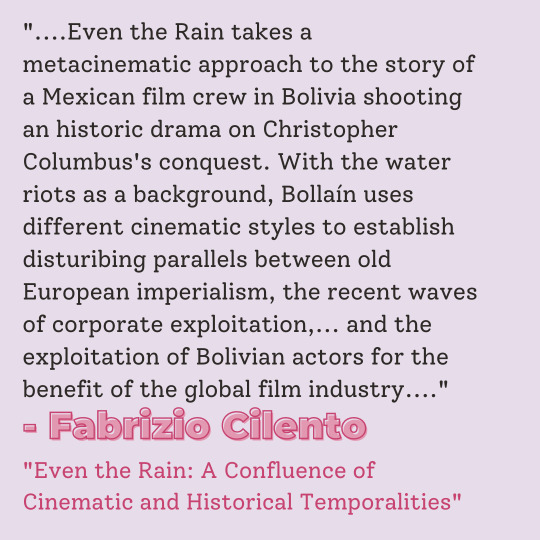
An example of the exploitative labor practices in the film industry can be found through the analysis of the film Even the Rain. In Fabrizio Cilento's article "Even the Rain: A Confluence of Cinematic and Historical Temporalities, Cilento breaks down how the film "takes a metacinematic approach to the the story of a Mexican film crew in Bolivia shooting an historic drama on Christopher Columbus's conquest. With the water riots as a background, Bollaín uses different cinematic styles to establish disturbing parallels between old European imperialism, the recent waves of corporate exploitation,... and the exploitation of Bolivian actors for the benefit of the global film industry.... Bollaín warns that these productions can fall into a colonialist dynamic by reproducing the imbalances between the 'visible' countries in the global film market, and 'invisible' countries whose native actors and visually appealing locations are exploited...." It is important to note how the persistence of capitalism and the exploitation of resources (whether that be land or labor) continue to work against decolonization and creates similar power imbalances between indigenous communities and corporate capitalists that allude to the colonial era. This is also a prime example of how there is a continued rift between the indigenous people's relationship to the land, especially through the limited access to water.
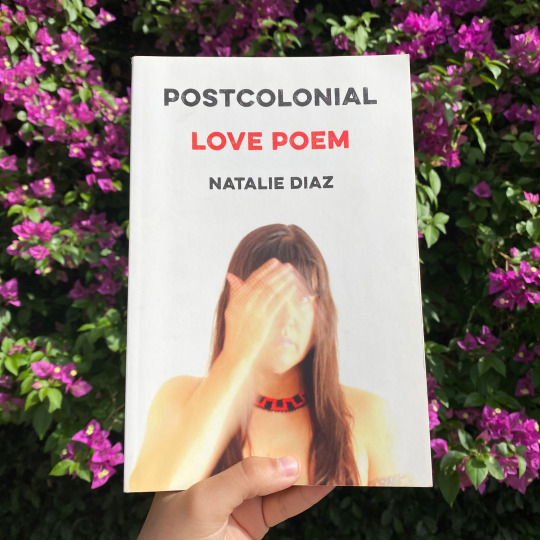
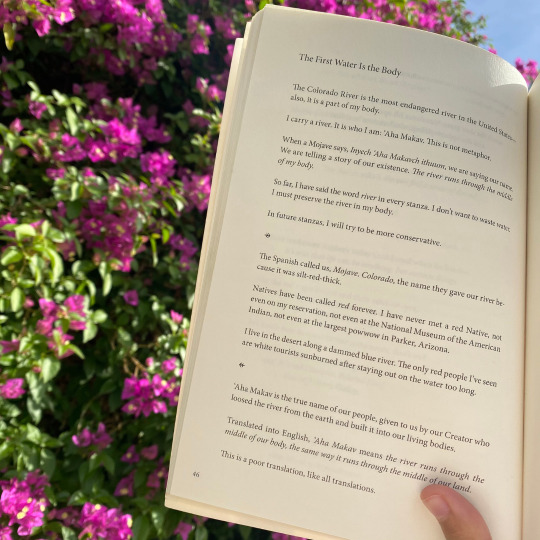
(Postcolonial Love Poem by Natalie Diaz)
So, I would like to make the point that capitalism and corporate interests play a huge role in working against decolonization. We do not live in a "Postcolonial" world, but rather, a neocolonial world that continues to exploit indigenous communities for their (quite frankly already limited) resources. Today, many Native Americans/Indigenous people have trouble accessing water like the First Nations in Canada, the indigenous tribes in the United States, and indigenous communities in Latin America and the Caribbean (whom are 10 to 25 percent less likely to have access to piped water than the region’s Non-Indigenous populations according to this page/report).
For more in depth discussion about the water and land crises indigenous communities are currently facing. All My Relations podcast, which is a podcast run by Matika Wilbur (a visual storyteller/photographer from the Swinomish and Tulalip peoples of coastal Washington) and Adrienne Keene (a citizen of the Cherokee Nation and blogger that discusses cultural appropriation and stereotypes of Native peoples in fashion, film, music, and other forms of pop culture, and a faculty member in American Studies and Ethnic Studies at Brown University.), have done an episode about this topic named Healing The Land IS Healing Ourselves in which they discuss with Kim Smith (a Diné woman, community organizer, citizen scientist, activist, water protector, entrepreneur, and writer) about indigenous' communities relationship with the land, how it relates to the current environmental and water crisis, and the relationship it has with healing our bodies, in which Smith discusses that "violence on the land is violence on our bodies".
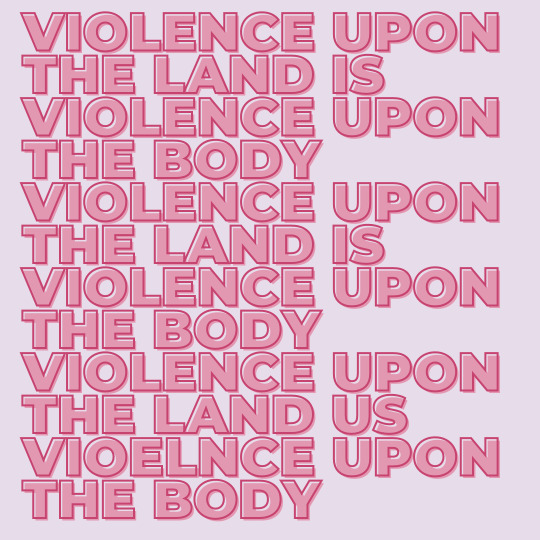
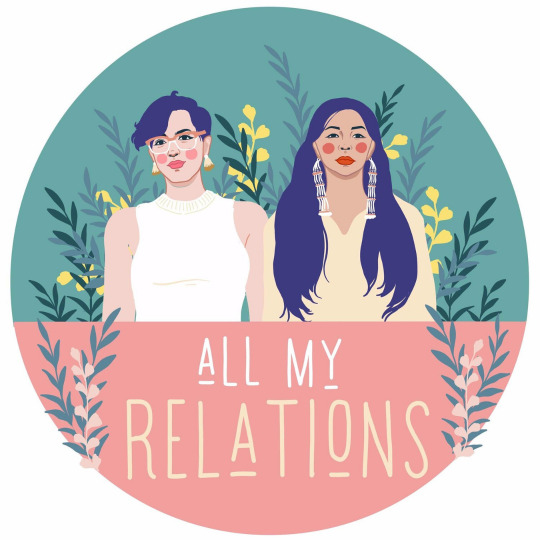
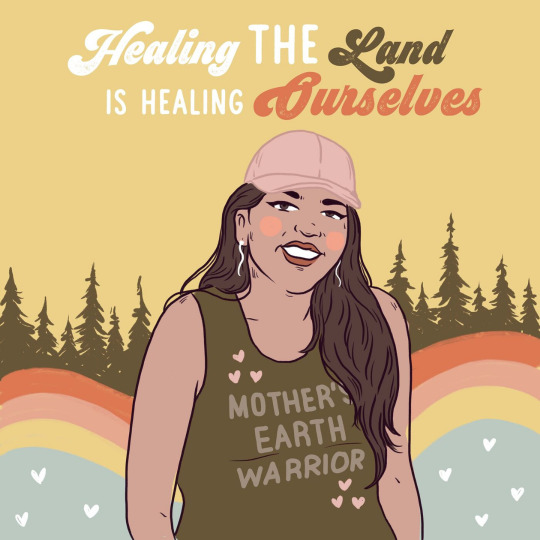
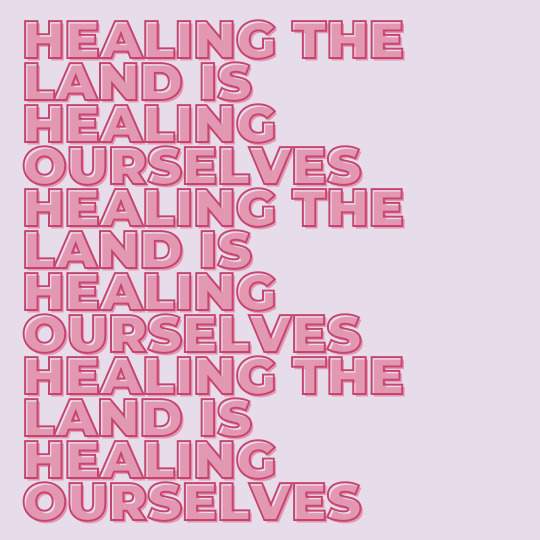
The Catholic Church, colonialism, sexuality, and it's influence today
When we're talking about colonialism in the Americas and the remnants of the colonial era today, the conquest of indigenous sexuality/eroticism via the Catholic Church and the repression of indigenous sexuality has played a huge part in colonialism and is still an issue today that perpetuates the erasure of indigenous identity.
In Sylvia Marcos's article "Indigenous Eroticism and Colonial Morality in Mexico: The Confession Manuals of New Spain" Marcos explains that "....By condemning indigenous erotic practices and imposing unprecedented restraints on them, the missionaries altered the roots of ancient Mexican perceptions of the body and the cosmos...." Marcos further unpacks this through probes of confession manuals from the colonial era "....The confession manuals of Molina, Baptista, Serra, and others seem to indicate the missionaries' uneasiness over the diversity of sexual pleasures enjoyed by the souls in their charge. The priests had to repeatedly describe their limited idea of sexuality so that the vital Indians could understand that what for them was often a link with the gods was, in their new religion, always a sin, fault, or aberration.... The morality of negation and abstinence propagated by the missionaries became one more weapon used in the violent process of violent acculturation...." It's important to point out that the repression of the sexual pleasures of indigenous peoples has contributed to the erasure of indigenous identity, especially since they considered it as a means of connecting to their gods. This was used as a weapon to conquer indigenous people's bodies through shame and disconnection from their bodies and spiritual practices.
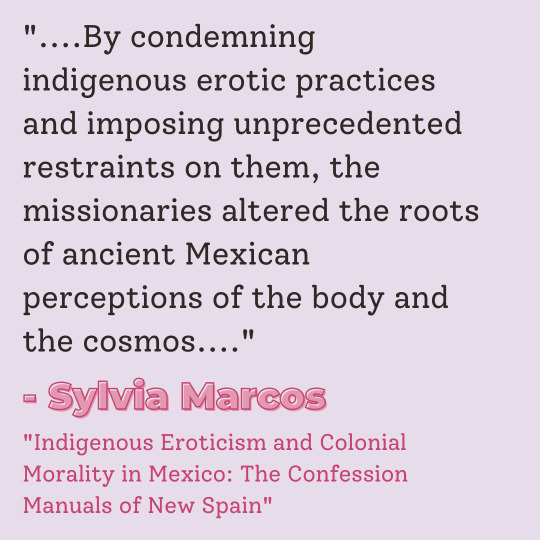
This is still an issue that persists today, this article by the Washington Post, talks about how transgender Native Americans experienced disproportionately higher rates of rejection by immediate family. It also talks about the state-sponsored Christian schools that have affected indigenous for generations in the United States. So, basically the expansion of Christianity/Catholicism culturally and institutionally and the repression of indigenous sexuality has contributed to the erasure of indigenous identity. And indigenous people that fall outside of the gender binary experience stigma still to this day, which perpetuates colonialism.
To further build upon this point and how to begin explaining the intersection of this with prison abolition and the experience of being Black and/or BIPOC in an imperialist white supremacist capitalist patriarchal society, Estelle Ellison, a Black Trans disabled writer and transformative justice practitioner, in their essay "Gender, Time, and Other Methods of Policing the Body", Ellison unpacks the intersections between exploitative racial capitalism and how it connects to gender, time, and sexuality, and also explains how it is connected to being policed through our bodies by stating that "By design, each of us is expected to participate in gendering other people's bodies...." and that "....of all the possible ways that a person may live their life at any given moment, the infinite combinations of features, experiences, aspirations, and expressions; gender attempts to reduce our possible identities by half. But half of infinity is still infinity..." Ellison also talks about how time has been colonized (via capitalism through wage labor) and is "made possible by overlapping systems of white supremacy, anti-blackness, patriarchy, ableism, misogyny, transphobia, homophobia, exploitation, and countless other forms of oppression..."
instagram
Ellison's analysis of the intersecting systems of neocolonialism explains how these systems are internalized in our bodies and how it is connected to exploitation (whether that be from our bodies some other form under these systems) and that we are being policed through our bodies due to societal, cultural, or institutional pressures, such as the prison industrial complex and the military industrial complex, or I would argue through religious beliefs.
Do you enjoy my content?
If you find my content to be interesting, please consider donating (but only if you can/would like/able to) so I can continue to post content with free resources and/or low-cost and accessible resources :)
Venmo: @Rebecca-Hiraheta
CashApp: $RebeccaHiraheta
Or if not, please feel free to support me by giving me a follow here or my other social media accounts
insta: @beccuhboo
personal blog: @beccuhboo
8 notes
·
View notes